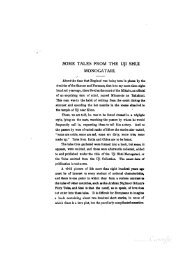Chau Ju-Kua - University of Oregon Libraries
Chau Ju-Kua - University of Oregon Libraries
Chau Ju-Kua - University of Oregon Libraries
You also want an ePaper? Increase the reach of your titles
YUMPU automatically turns print PDFs into web optimized ePapers that Google loves.
1)6 PAGAN. 59<br />
Notes.<br />
1) The Ling-wai-tai-ta, 2,ii, from which nearly the whole <strong>of</strong> this chapter is taken, reads<br />
as follows: «The kingdom <strong>of</strong> Fu-kan is five day's journey from the kingdom <strong>of</strong> Ta-li (S. W. Yan-<br />
nan), and from Wa-li_(a dependency <strong>of</strong> Chon-la referred to previously) it is sixty days thither.<br />
5 Its boundary line (f^) is the «Black-water muddy Eiver» (|^ ;A^ W^ Vt M ^^^<br />
Irrawadi?), where begin the kingdoms <strong>of</strong> the West—which cannot (all) be known (^ pj* ^).<br />
The king <strong>of</strong> the country <strong>of</strong> Fu-kan and the <strong>of</strong>ficials wear golden caps (or hats), in shape like a<br />
rhinoceros horn. They have horses and they ride them without saddles. The king's palace has<br />
tiles made <strong>of</strong> tin {^f); in the interior the ornamentation <strong>of</strong> the rooms is in gold and silver.<br />
10 There are several tens <strong>of</strong> Buddhist temples, and all the priests wear yellow robes .<br />
.<br />
.» (Then<br />
follows the passage forming the fourth paragraph <strong>of</strong> our text. After this the chapter concludes<br />
with the following:) «In the 2d moon <strong>of</strong> the fifteenth year ts'ung-ning <strong>of</strong> Hui-tsung (<strong>of</strong> the Sung,<br />
H03), P'u-kan sent tribute to the Court <strong>of</strong> China».<br />
The name <strong>of</strong> P'u-kan does not appear to occur in Chinese works earlier than the Ling-<br />
15 wai-tai-ta, and the tribute mission <strong>of</strong> 1 103 — which is duly recorded in Sung-sh! (20,4) seems to<br />
be the first appearance <strong>of</strong> P'u-kan at the Chinese Court, for the Annals for the king-to period<br />
(1004—1007) do not bear out our author's statement <strong>of</strong> a mission from P'u-kan in that year, nor<br />
his other statement that one from San-fo-ts'i came there also in that year. The Annals (Sung-shi,<br />
7,s) do, however, mention, under the year 1004 the presence at Court <strong>of</strong> a mission from P'u-tuan<br />
20 (^B ^ss) together with missions from Chan-ch' ong and the Ta-shii (Arabs). Again under the<br />
years 1007, 1020, 1030, 1042, 1050, 1053, 1056 and 1061 P'u-tuan is recorded to have sent<br />
missions to Court. Ma Tuan-lin (Ethnographic, II, 586) begins his very short account <strong>of</strong> P'u-kan<br />
with the mission <strong>of</strong> 1106. Can P'u-tuan, about which we know nothing, save that Ma Tuan-lin<br />
(Op. cit , II, 538) tells us that it was reached by sea after some seven days sailing from Chan-<br />
25 ch'ong, be an earlier form <strong>of</strong> P'u-kan? It seems probable.<br />
The article on P'u-kan in the Sung-shi (489,ii), while supplying absolutely no information<br />
on its geographical position or concerning its people, says that when the P'u-kan mission <strong>of</strong> 1106<br />
arrived at Court, the President <strong>of</strong> the Board <strong>of</strong> Kites (probably after a protest from the P'u-kan<br />
envoys) stated that, when in the hi-ning period (1068—1077) Chu-lien (Coromandel Coast, the<br />
30 country the nearest to P'u-kan <strong>of</strong> which the Chinese were cognizant) sent a mission to Court, the<br />
king <strong>of</strong> Chu-lien had been written to by the Board <strong>of</strong> Rites on plain white paper, as he was a<br />
vassal <strong>of</strong> San-fo-ts'i. Fu-kan, he went on to say, was an important (and independent) kingdom, and<br />
should not be treated like the princelet (<strong>of</strong> Chu-lien); it should be addressed with the same<br />
forms as the Ta-shit (the Caliph) or the sovereign <strong>of</strong> Kiau-chi. See also infra p. 96.<br />
35 The identity <strong>of</strong> P'u-kan with Pugan or Pagan on the Irrawadi between the mouth <strong>of</strong> the<br />
Shindwin and Prome is generally accepted. In the eleventh and twelfth centuries P'u-kan ruled<br />
over Burma from Bhamo south—including Pegu and Arakan — the latter state, at all events, was<br />
under its suzerainty. The kingdom <strong>of</strong> Pagan was overthrovn by the Mongols, who captured the<br />
capital in 1284. Phayre, Hist, <strong>of</strong> Burma, 18—54.<br />
40 Schlegel, T'oung-pao, IX, 90, tried to show that P'u-kan was Pahang in the Malay<br />
Peninsula—a country known to Chinese mediaeval writers as Fong-hong (^ "^), but his<br />
argument was extremely weak and his identification has not been accepted by any subsequent<br />
writers. If there could be any doubt as to the identity <strong>of</strong> Fu-kan with Pagan, we might refer to<br />
the account <strong>of</strong> the Mongol conquest <strong>of</strong> Mien or Burma, contained in the Yiian-shi, 210,5, where<br />
45 a victory over P'u-kan (written as in our text) in 1287 is said to signify the complete pacification<br />
<strong>of</strong> Mien resulting in the payment <strong>of</strong> an annual tribute <strong>of</strong> local produce. Again in the Yuanch'au-ch5ng-Mien-lu<br />
(j^ S^ ^j^ ^ ^) or ((Account <strong>of</strong> the war <strong>of</strong> the YUan dynasty<br />
against Burma», and which dates from the Mongol period, there are a number <strong>of</strong> passages in<br />
which P'u-kan is mentioned as a dependency <strong>of</strong> Mien.<br />
50 2) Quotation from Ling-wai-tai-ta, see supra, n. 1.<br />
3) Better known as Chu-ko Liang. He is credited with having led an expedition into the<br />
heart <strong>of</strong> Burma somewhere about A. D. 225. Giles, Chin. Biograph. Diet. 180.<br />
4) See supra, n. 1, § 2.

















